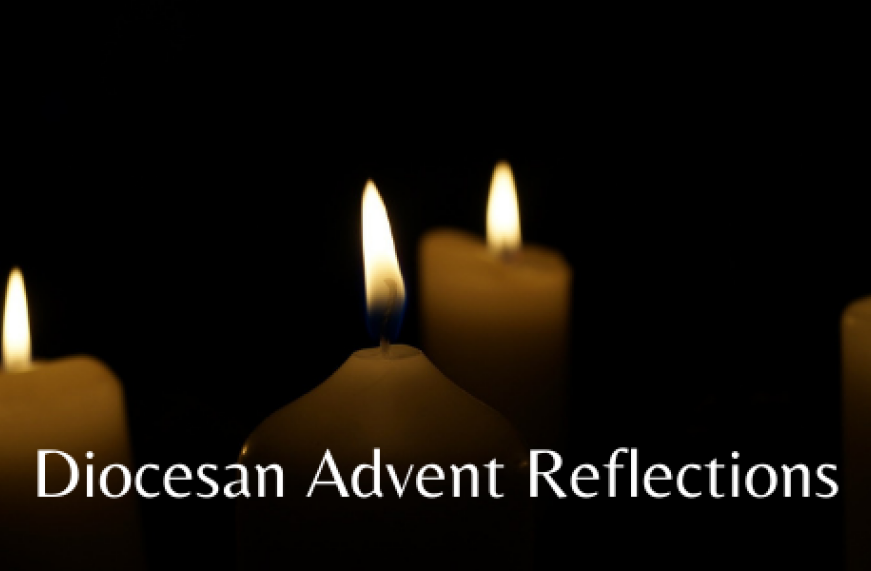Daily Advent Reflection: December 22

Fourth Tuesday of Advent
Psalms 66, 67 · 116, 117
Isa 11:10-16
Rev. 20:11--21:8
Luke 1:5-25
“I love that the LORD hears my voice, my plea for mercy.” (Ps. 116, v. 1, A New Psalm)
“The LORD protects the simplehearted;/when I was in great need, he saved me.” (Ps. 116, v. 6, NIV)
The second verse of Psalm 116 leapt out at me when I was meditating on the readings for this day. The word that struck me was “simplehearted.” All of the other translations in my house use the word “simple,” including the Book of Common Prayer. “Simplehearted” is so fresh, so winsome; yet, how seldom I am simplehearted! I approach the world with doubt, questions—to be truthful, often with cynicism. I work very hard at protecting myself from…from what? From disappointment? From having my hopes crushed, my fears realized? What a burden to bear! What would it feel like to simpleheartedly let go of that burden, to trust God to be the strength that I’ll need? I can hardly imagine it; the self-protection that I viewed as safety has restricted my soul’s ability to relax, to laugh, to be free.
All through Advent, we have been looking forward to the coming of a child, an infant completely dependent on the adults in his life to protect him. Those adults were in difficult straits, roughing it in a stable/cave because even money couldn’t buy them shelter in an inn. There was NO room. The perception of scarcity makes us human creatures grasp even more tightly the little we have, feeling we must do “whatever” to protect what is ours. In Bethlehem that night, there was so little room that no one felt they could give up their space, not even for a man with a very pregnant wife. Only a simpleton would do that because anyone could see that the donor would now be the one without a room. Besides, what difference would one night’s lodging make in the life of that couple? The man was sturdy and the girl was young; surely, they would be okay.
How far we have come from “simplehearted!” Wretched human that I am, who can free me from the restraining bonds of my own self-protection? Thanks be to God, the infant who was born in the cave that night has shown the way. “Become like little children,” he said. “Blessed are the meek,” he taught. “Be like the Samaritan,” he illustrated, featuring a social pariah who saw another’s need and responded with compassion before his “better mind” could enumerate the risks. (I’ve often wished I could hear what his wife said when he got home with less money than she was expecting. For her sake, I hope she rolled her eyes and said, “You’re such a simpleton—and that’s why I love you so!”)
My digression has brought me back to Psalm 116 and its opening words: “I love.” What a wonderful way to open a statement! Imagine how much better our lives would be if we could begin our interior monologues as well as our public speech with those words. My Christian and Jewish commentaries note that the phrase, “I love,” is left without a noun object. Normally, we say “I love X,” like “I love apple pie,” or “I love you.” But the writer of this psalm began simply with “I love.” To help contemporary readers with this object-less opening, my modern Jewish translation (which I love) writes “I love that the Lord hears my voice.” One little word, “that,” provides a delightful space for other constructions to rush in. My love is no longer tied to a bare noun; instead, it’s freed to embrace clauses. I can say to my two-year-old, “I love that you are so curious about every single pot and pan in our cupboards.” I do, and I did! I remember my children’s terrible twos and in spite of it all, I loved each two-year-old, even with pots and pans all over the floor.
For me, the objectless beginning of the Psalm gives space for the simplehearted. It allows me to open my arms wide and dance in the snow instead of only grumbling while I scrape the car windows. It reminds me that, while I dance, I have a spotter, Someone who will catch me when (not if) I fall. I can almost feel restraints slipping from my wrists as I reach out to embrace God’s amazing, surprising, confounding creation. This coming Christmas season, I want to live into the “that space,” beginning my sentences with a simplehearted “I love” and discovering what or Who will enter the new place in my soul.
Sheryl Slocum
St. Thomas of Canterbury Episcopal Church, Greendale
